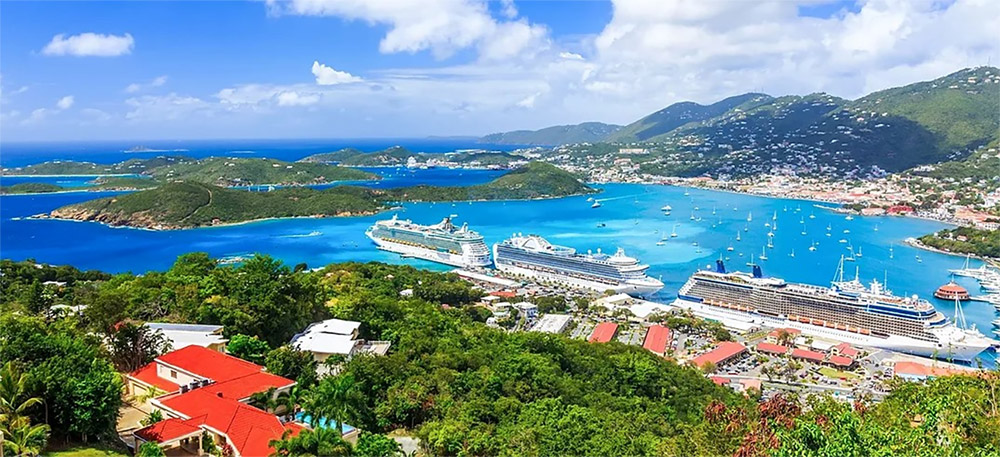The U.S. Virgin Islands (USVI) believes its oil refinery infrastructure and port hold the keys to making it a strategic hub for business.
The Territory, located at the crossroads of North, Central, and South America, has long offered a unique combination of logistical advantages, regulatory exemptions, and generous tax incentives that make it attractive to some manufacturers, but the islands are pushing ahead with an infrastructure revitalization that could boost several sectors, especially shipping.
One of the centerpiece projects will be the development of a new shipyard and floating drydock facility that might satisfy a growing demand for ship repair services in the Caribbean, a region that sees high maritime traffic. The viability of this initiative is backed by a recently completed shipyard feasibility study and the USVIEDA is looking for investors interested in establishing a shipyard, further enhancing the Territory’s maritime industry and economic growth.
The shipyard will serve as a strategic repair hub for vessels that currently have limited repair options in the area, helping reduce the need for ships to travel to distant ports such as those in Florida.
90%
The potential economic impact of the shipyard is substantial.
“This project is a huge economic driver for St. Croix, with the potential to bring in well-paying jobs and boost local industry,” Wayne Biggs, CEO of the USVIEDA, noted during a recent interview with Area Development.
Complementing the shipyard development is the USVI’s Jones Act exemption, which allows the Territory to facilitate international shipping without the restrictions typically placed on U.S. ports. The Jones Act mandates that only U.S.-flagged ships can transport goods between U.S. ports, but the USVI's exemption allows foreign-flagged vessels to operate freely between the islands and other U.S. ports.
This project is a huge economic driver for St. Croix, with the potential to bring in well-paying jobs and boost local industry.
This creates a significant logistical advantage, enabling companies to reduce costs and transit times.
With regular shipping lines such as Tropical Shipping already utilizing the territory, the new infrastructure projects are expected to attract even more shipping activity, particularly for cargo destined for smaller Caribbean islands.
In addition to maritime infrastructure, the USVI is also focusing on reviving its oil refinery on St. Croix, once one of the largest in the Western Hemisphere. While the refinery has faced challenges in recent years, including environmental issues and ownership changes, the local government remains committed to bringing it back online.
Jennifer Nugent-Hill, Director of Government and Community Affairs at Tropical Shipping, whose company partnered with the Virgin Islands Port Authority on the port revitalization, says the improvements will help improve supply chain efficiency – a demand that retailers, building material suppliers and groceries stores like those in our islands make of the companies that ship their goods.
One
"The infrastructure upgrades will allow us to enhance the efficiencies and productivity of our operations, reducing the time our ships spend in port and ensuring faster turnaround for goods. This will not only benefit our company but also support the broader logistics network across the Caribbean, making the USVI a more strategic hub for shipping and transshipment," Nugent-Hill said.
The infrastructure upgrades will allow us to enhance the efficiency and productivity of our operations, reducing the time our ships spend in port.
The vision for the USVI’s future is encapsulated in its Vision 2040 plan, which outlines long-term goals for economic growth through diversified industries. This includes not only shipping and manufacturing but also clean energy initiatives. Solar arrays and other renewable energy projects are being implemented across the islands, with the aim of reducing the territory’s carbon footprint and creating a more sustainable industrial ecosystem, says Nadine Marchena Kean, Director, Enterprise Zone Commission at USVI EDA.
For manufacturers and site selectors, the USVI presents a compelling case for investment. The combination of tax incentives, the Jones Act exemption, and the islands' strategic location offers significant advantages. Companies establishing operations in the USVI can benefit from federal tax reductions of up to 90 percent, exemptions on import and export duties, and access to a skilled workforce ready to support a wide range of industries, from manufacturing to maritime services. Furthermore, any products made on the islands can boast of being made in America.
“The U.S. Virgin Islands offers manufacturers a unique blend of U.S. legal protections and international logistical flexibility. We have the infrastructure, the incentives, and the geographic advantage to make this a prime location for businesses looking to expand in the Caribbean,” Biggs said.



